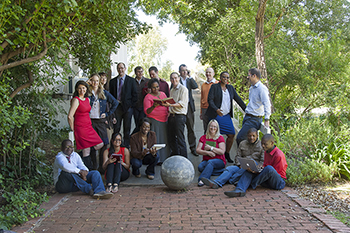Latest News Archive
Please select Category, Year, and then Month to display items
25 September 2024
|
Story Jacky Tshokwe
|
Photo Supplied
 Prof Louise Cilliers, University of the Free State (UFS) research fellow and former head of the Department of Classical Studies.
Prof Louise Cilliers, University of the Free State (UFS) research fellow and former head of the Department of Classical Studies.
Prof Louise Cilliers, one of our esteemed research fellows and former head of the Department of Classical Studies, has been awarded the prestigious 2024 UJ Translation Prize. Prof Cilliers received this accolade for her exceptional Afrikaans translation of the renowned Greek poet Konstantinos Kavafis' poetry collection, Van Alexandrië na Ithaka, published by Naledi.
Konstantinos Kavafis (1863-1933) is considered one of the most important literary figures in modern Greek poetry, known for his reflective and often philosophical poems that explore themes of history, identity, and human experience. In Van Alexandrië na Ithaka, Prof Cilliers brings the essence of Kavafis’ work to Afrikaans readers, carefully preserving the poet’s rich symbolism, historical depth, and emotional nuances.
Prof Cilliers has had a distinguished academic career, having served as head of the Department of Classical Studies. Her expertise in classical languages and literature, coupled with her passion for translation, made her an instrumental figure in making classical texts more accessible to a broader audience. This award is not only a testament to her scholarly achievements, but also to her dedication to the cultural and literary enrichment of the Afrikaans language.
The UJ Prize for Translation honours outstanding translations of literary works into any of South Africa’s official languages. Prof Cilliers' recognition continues the department's proud tradition of excellence in classical scholarship and language studies.
We extend our heartfelt congratulations to Prof Cilliers for this remarkable achievement and are excited to celebrate her continued contributions to the field of classical studies and translation.
About the UJ Translation Prize
The University of Johannesburg Translation Prize celebrates the best translations of literary works into any of South Africa’s official languages. It aims to promote high standards of literary translation and showcase the importance of bringing international literary voices into the local context through translation.
Prestige Scholars Programme invests in promising academics
2015-06-24

Photo: Sonia Small |
Whilst many academics find it challenging to have sustainable funding for specific projects, it is often just as challenging to find relevant exposure and good mentorship programmes to fully prepare academics toward becoming full professors.
Prof Jonathan Jansen, Vice-Chancellor and Rector of the UFS, designed the Vice-Chancellor’s Prestige Scholars Programme (PSP) specifically targeting newly-completed post-doctoral students who are already members of the academic staff.
The goal is to select the most promising young scholars and to make substantial institutional investment in their development.
To date, the PSP has produced 2 Fulbright scholars; 10 National Research Foundation (NRF) rated scholars; 1 NRF Blue Skies research project and 14 NRF Thuthuka-funded projects. These scholars work with the best academics at leading universities on three continents.
Prof Jackie du Toit, co-director of the programme, explains that while the PSP does not provide funding, it is a great programme to empower scholars by means of assistance towards generating funding from outside sources.
Prof Du Toit co-directs this programme with Proff Corli Witthuhn, Vice-Rector: Research and Niel Roos from the Department of Africa Studies.
“The PSP bases its approach to funding on the philosophy that young scholars are to be encouraged towards financial independence, based on a viable postdoctoral project that would sustain their scholarship for five to eight years post PhD. We believe that the cachet and long-term sustainability of existing funding programmes such as Fulbright outweighs the short-term benefits of automatic funding from the PSP. We also endeavour to teach young scholars to work cleverly within institutional parameters, rather than leave them floundering once they step off the active PSP.”